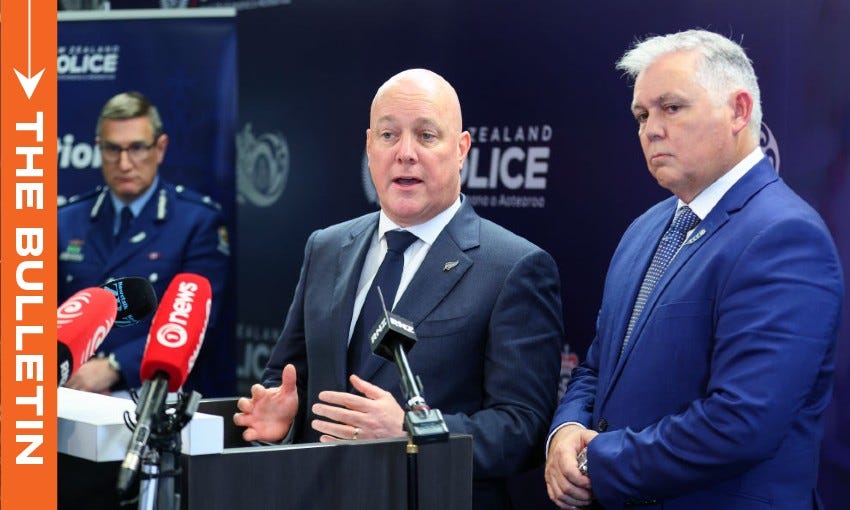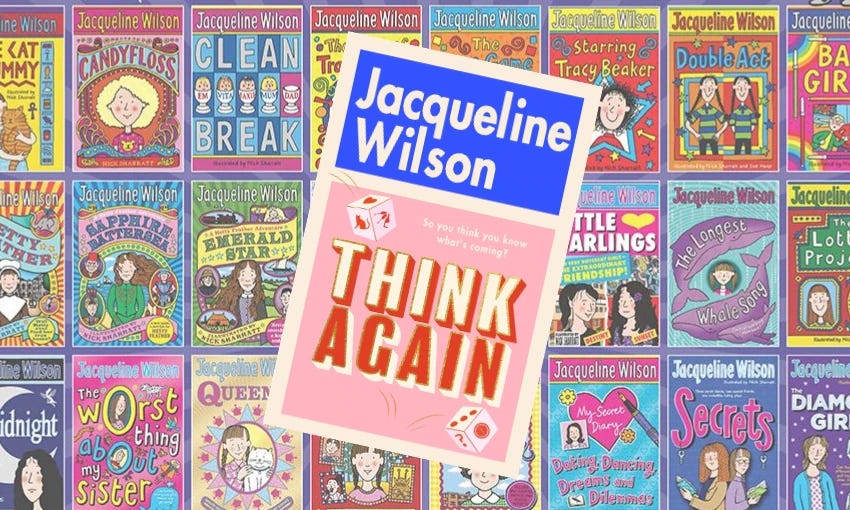Gangs bill passes as debate brews over future of gun registry
Plus, what had the PM fuming over the "frickin targets"?
Mōrena, and welcome to The Bulletin for Friday, September 20.
In today’s edition: The economy shrunk by 0.2% over the June quarter, microplastic pollution could more than double by 2040, and it’s been a decade since Kim Dotcom’s “Moment of Truth”. But first, the government caps “crime week” with the passing of its controversial anti-gangs legislation.
Gangs bill passes with last minute additions
The government’s gang bill has passed, including the two new additions giving police extra search powers to clamp down on the display of patches even in the home, as the PM pledges to “harass” gang members. The ban on gang patches will kick in from November 21, reported 1News’ Felix Desmarais, as will new powers to allow police to stop criminal gangs from associating and communicating. In line with the coalition agreement, greater weight will also be given to gang membership at sentencing, said the justice minister Paul Goldsmith.
The ability for police to search a person’s home for gang insignia if they had breached the public ban three times was a controversial last minute amendment to the government’s bill. A second amendment extended the ban to private vehicles. As discussed on the latest episode of Tova O’Brien’s Stuff podcast, the human rights impact of these changes wasn’t assessed and concerns have been raised about possible Bill of Rights implications. Ministers have defended it, despite concern it didn’t face public scrutiny, but the police minister Mark Mitchell admitted the rushed process wasn’t ideal, reported the Herald’s Adam Pearse.
Police bolster numbers… or do they?
The passing of the gang legislation capped what has been a heavily crime focussed week for the government. We’ve talked about the subject basically every day this week – from the PM’s police ride along over the weekend through to controversy over crime figures (another reminder to read Alice Neville’s feature on The Spinoff).
Yesterday saw another crime-related announcement, reported Stuff’s Glenn McConnell, with confirmation of where the 500 additional police officers promised by the government would be allocated. About 160 will join community patrols, while 77 will be deployed directly to the new gang disruption units established by the government. The problem, noted McConnell, is that due to attrition, there are now 43 fewer officers in the force than when the coalition came into power in November. And, of the “new” 500 officers, 167 will be filling vacancies that have been empty since last year.
‘Frickin targets’
Meanwhile, the prime minister was visibly frustrated by a line of questioning from a reporter while making the announcement about new police officers. The prime minister, along with police minister Mark Mitchell, was asked about police removing gang members from the national gang list. It was said to be to ensure that the list is accurate by, for example, removing deceased gang members. Luxon was asked whether this was politically “convenient” given it may show the official number of gang members dropping. “Guys, guys, no disrespect,” Luxon said. “It’s not about the frickin targets, it’s about outcomes.”
Given the outcomes – such as reducing violent crime – are based on the “frickin targets”, it’s a slightly unusual remark for the prime minister to make, along with the fact this government has prided itself on announcing targets across a number of areas (in the Herald this morning, an update on the government target to reduce jobseeker benefit numbers, for example).
Debate brewing over gun registry
The passing of the gangs legislation doesn’t signal the end of the government’s crime focus. And as Jenna Lynch reported for ThreeNews, a new tussle between cabinet members could be brewing over the future of the gun registry. Act campaigned on ditching the registry, but National and the police back it. “The register will stay, no doubt about that,” said Mark Mitchell this week. That’s a pretty definitive response, but firearms reform minister Nicole McKee, who is in charge of the registry, wants to stick with the coalition pledge of a review. “No minister can make that decision by themselves… and we are part of a coalition,” she said.
Join The Spinoff Members
"Happy to be alive, proud to be a member. Keep up the good work." - Neera, Spinoff member.
If you value our work and want to support us, please consider becoming a member today. Already a member? Thank you!
Microplastic pollution could more than double by 2040
New research shows microplastic pollution could more than double by 2040, even if no new plastics are made. The tiny pieces of plastic are nearly impossible to remove once dispersed, have been found in more than 1,300 animal species, and have unknown long-term impacts on human health. They’ve even been detected in the human brain, a recent study claimed. The new research, published in the journal Science overnight, reviews 20 years of microplastics research and calls for a multi-disciplinary approach to regulation.
In comments via the Science Media Centre, Auckland University’s Joel Rindelaub said that mitigation strategies have not developed to a level that can adequately address environmental plastic pollution. “Many researchers believe the most effective strategy to reduce plastic pollution would be to focus on preventative measures, as plastic production is currently increasing exponentially on a global level,” he said.
GDP shows 0.2% decline
The economy shrunk by 0.2% over the June quarter, with all signs pointed to a return to recession when the next round of data is revealed later in the year. As we discussed yesterday, whether or not an official recession is declared is a bit pointless – for all intents and purposes we’ve been in one for about two years, as Kiwibank’s chief economist Jarod Kerr said.
Writing for Interest, Dan Brunskill said that while the headline figure doesn’t sound too bad, it doesn’t take into account population growth. Per capita, annual GDP fell by 2.7% – the largest annual decline since the 2008 recession. “New Zealand seems to be experiencing a second Great Recession,” he argued.
Listen: When the interest rates change
Kiwibank chief executive Steve Jurkovich joins Bernard to discuss the current economic landscape and what’s happening (and likely to happen) with interest rates. Steve also shares his thoughts on the future of Kiwibank, open banking and if he considers possible banking plays by likes of Apple and Google to be a legitimate threat.
Click and Collect
Toby Manhire reflects on The Moment of Truth, the Kim Dotcom-fronted political event that took place a decade ago this week.
The battle over who was right about the management structure of Health NZ continues, with Shane Reti claiming a document proves the agency considered unusual job titles like “locality wayfinders”, “barrier removalists”, and “boundary spanners”. Take your pick.
A Bluebridge ferry has arrived back in Wellington, about five and a-half hours after it lost power and started drifting in Cook Strait.
Newsroom Pro’s Sam Sachdeva reports on the low-key visit from a leading figure within the Chinese government’s propaganda system that included a speech with John Key, but no meetings with anyone from our government. (paywalled)
The prime minister has thrown his support behind the “long tunnel” proposal for Wellington. Maybe he read The Spinoff’s cost-benefit analysis from earlier in the year?
A fleet of pothole monitoring vans will patrol the roads looking for signs of wear and tear.
More than 200 civilian Defence Force staff have opted for voluntary redundancy – and more job cuts are on the horizon.
Miriam Moore ranks every Jacqueline Wilson book she’s ever read. Alex Casey reveals that record numbers of New Zealanders are crossing the ditch to join the cast of The Office Australia. The Spinoff Guide To Life has some useful advice on catching the bus. Duncan Greive celebrates the ACC's Game of 2 Halves quiz show reboot. Lyric Waiwiri-Smith spends a day at the (home) nail salon. Bea Joblin asks whether we're treating te reo Māori as an occasional snack or as daily bread. Hera Lindsay Bird advises a reader concerned that they're always the most annoying person in the room.
That’s it for another week, thanks for reading. I’ll be back on Monday morning. Have a wonderful weekend!
Want to get in touch? Join the conversation in the Substack comments section or via email at thebulletin@thespinoff.co.nz if you have any feedback on today’s top stories (or anything else in the news).
If you liked what you read today, share The Bulletin with friends, family and colleagues.















I wonder if there are some National MPs who wish they had gone into coalition with the Greens, or even Labour, instead of Act and NZFirst.